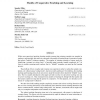Free Online Productivity Tools
i2Speak
i2Symbol
i2OCR
iTex2Img
iWeb2Print
iWeb2Shot
i2Type
iPdf2Split
iPdf2Merge
i2Bopomofo
i2Arabic
i2Style
i2Image
i2PDF
iLatex2Rtf
Sci2ools
153
Voted
JMLR
2011
2011
Models of Cooperative Teaching and Learning
While most supervised machine learning models assume that training examples are sampled at random or adversarially, this article is concerned with models of learning from a cooperative teacher that selects “helpful” training examples. The number of training examples a learner needs for identifying a concept in a given class C of possible target concepts (sample complexity of C) is lower in models assuming such teachers, that is, “helpful” examples can speed up the learning process. The problem of how a teacher and a learner can cooperate in order to reduce the sample complexity, yet without using “coding tricks”, has been widely addressed. Nevertheless, the resulting teaching and learning protocols do not seem to make the teacher select intuitively “helpful” examples. The two models introduced in this paper are built on what we call subset teaching sets and recursive teaching sets. They extend previous models of teaching by letting both the teacher and the learner expl...
Related Content
| Added | 14 May 2011 |
| Updated | 14 May 2011 |
| Type | Journal |
| Year | 2011 |
| Where | JMLR |
| Authors | Sandra Zilles, Steffen Lange, Robert Holte, Martin Zinkevich |
Comments (0)

